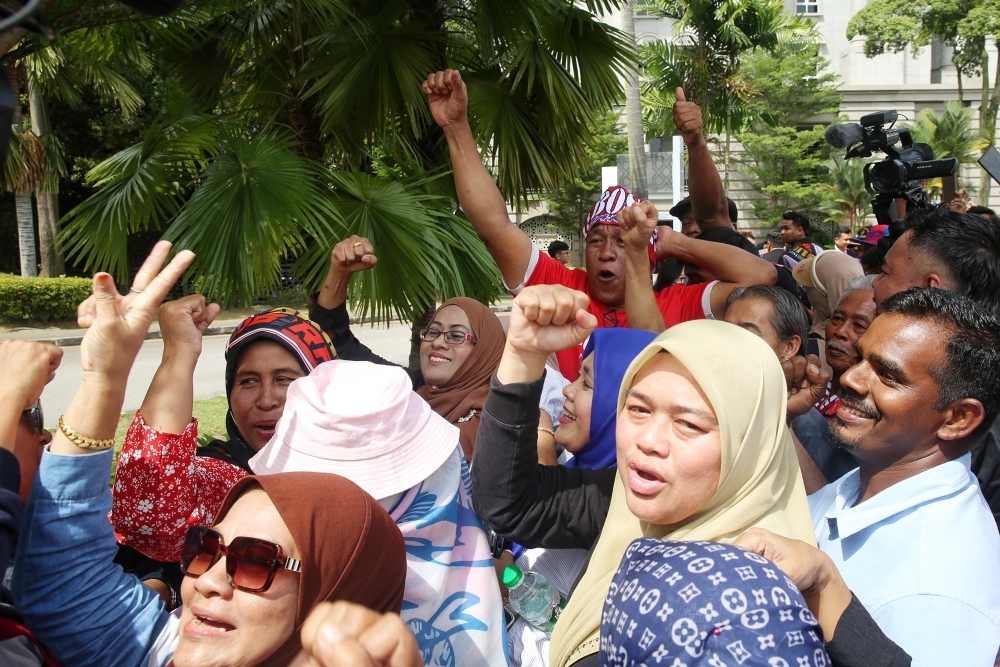PUTRAJAYA, Jan 6 — The Court of Appeal today allowed Datuk Seri Najib Razak’s appeal against the dismissal of his bid to compel the Malaysian government to produce a purported “supplementary order” from the previous Yang di-Pertuan Agong that would see him serve the remainder of his jail sentence under “house arrest”.
The three judges who sat on the Bench were split in their decision, with Datuk Azhahari Kamal Ramli and Datuk Seri Mohd Firuz Jaffril ruling in favour of Najib while Datuk Azizah Nawawi, who chaired the panel, dissented.
The majority ruling also allowed Najib to adduce additional evidence to support his claim of the existence of such an addendum.
Today’s ruling means that Najib is allowed to have the merits of his judicial review of a purported addendum issued by the 16th Yang di-Pertuan Agong — which permits him to serve the remainder of his six-year prison sentence under house arrest — heard by the High Court.
In allowing Najib to adduce additional evidence in the form of his son Datuk Muhammad Nizar’s affidavit to support his claim of the addendum’s existence, Mohd Firuz said Najib had previously written to six of the respondents seeking confirmation of the supplementary order’s existence but none were forthcoming.
In fact, Najib himself had attempted to obtain evidence of the document’s existence from various sources including those of Umno president Datuk Seri Ahmad Zahid Hamidi and Pahang Menteri Besar Datuk Seri Wan Rosdy Wan Ismail.
At the High Court, the learned High Court judge then decided that the information obtained from these various sources were hearsay evidence.
Post-judgement, Mohd Firuz said Muhammad Nizar managed to obtain an original unsigned copy from the Pahang palace with strict instructions that the same should not be used without the consent of the Sultan.
“Without the consent, it was not possible for the applicant to file the addendum into court nor can the applicant compel the Sultan to furnish the said addendum,” Mohd Firuz said.
Mohd Firuz also noted the fact that there was no rebuttal affidavit from the Malaysian government challenging the existence nor the authenticity of the Supplementary Order was rather compelling.
“We must state that at this stage, we are not concerned about the authenticity of the same. Rather it is, whether the addendum concerned exists or otherwise.
“We are of the considered view that the failure of the respondent to challenge the same means this court cannot simply ignore the existence of the order by the then Yang di-Pertuan Agong,” he said.
As for the main appeal concerning the High Court’s dismissal for leave, Mohd Firuz said the court took note that the High Court judge’s reasoning was based on the fact that Najib had relied on hearsay evidence at the time of hearing.
“Premised on the new evidence admitted by the applicant, we find that the issue of hearsay can no longer stand.
“Bearing in mind, that an applicant in a judicial review only needs to show that he or she has a good arguable case premised on the fact that his interest or rights have been aggrieved and one that is not frivolous and vexatious, we are minded to allow the appeal.
“We hereby order the matter to be remitted to the High Court for the hearing of the substantive judicial review application,” he said.
Azizah, as the sole dissenting judge, said there was no appellable error in the High Court judge’s findings as Najib had omitted to produce an affidavit affirmed by Investment, Trade and Industry Minister Datuk Seri Tengku Zafrul Abdul Aziz.
In the High Court, the affidavits in support filed by Zahid Hamidi and Wan Rosdy were ruled as hearsay.
She also noted that there had been a delay since Muhammad Nizar only obtained the addendum many months after the High Court ruling on July 3.
“Therefore, I am of the considered opinion that there is no merit to this application for fresh evidence,” she said.
Azizah said the High Court was also correct in its ruling that a mandamus order could not be granted against the Pardons Board since there are no provision in written law or the Federal Constitution that could compel the board to confirm or disclose any existence of a pardon order, including the addendum order.
Case management for Najib’s judicial review bid to be presided over by a new High Court judge has been set for January 13.
A total of seven respondents were named in Najib’s suit, namely the home minister, the Commissioner General of Prisons, the Attorney General, the Federal Territories Pardons Board, the Minister in the Prime Minister’s Department (Law and Institutional Reform), the Director General of Legal Affairs Division and the Malaysian government.
In his application for leave to seek judicial review filed on April 1, 2024, Najib claimed Al-Sultan Abdullah Ri’ayatuddin Al-Mustafa Billah Shah issued the order during the January 29, 2024 meeting of the board, for the former to serve the remainder of his reduced sentence under house arrest.
In the application, Najib alleged that he received confirmation on February 12, 2024, about the issuance of the “supplementary order” or Addendum Order, which would allow him to serve a reduced prison sentence at home instead of the Kajang Prison where he is currently housed.
On February 2, 2024, the Pardon’s Board halved Najib’s sentence to six years for misappropriating funds amounting to RM42 million, which means he could be released as early as August 23, 2028.
Najib has been imprisoned since August 23, 2022, after the Federal Court upheld his conviction for criminal breach of trust, power abuse, and money laundering over the misappropriation of SRC International Sdn Bhd’s funds.
The Pardon’s Board said it had also decided to reduce his RM210 million fine to RM50 million, and his early release would be contingent on him paying this amount.
Other reliefs sought by Najib include for the court to compel the respondents to execute said supplementary order.




















